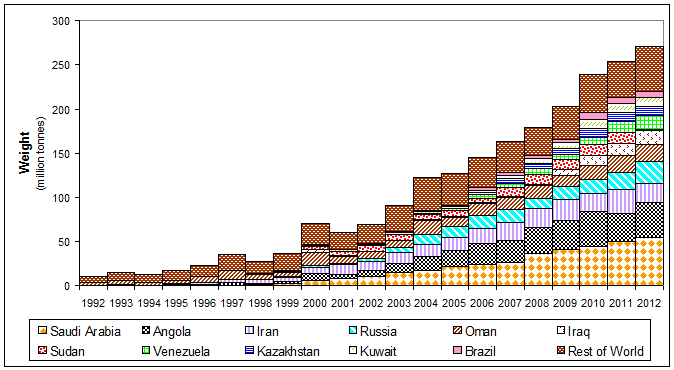|
|
||
|
|
||
|
China's imports of fossil fuel |
||
|
Source of data
fromn which the following three charts have been prepared: UN Comtrade (whose source is Department of Statistics, General Administration of Customs of the People's Republic of China) China's
imports of specific fossil fuels (customs codes 2701,
2709, 2710 and 2711):
China's
imports of crude oil (customs code 2709):
China's
imports of coal (customs code 2701):
|
||
|
Through companies which it controls, particularly Petrochina (a subsidiary of China National Petroleum Corporation) the government of China is fuelling (sic) genocide in Darfur, Sudan. Due to their joint ventures with the China National Petroleum Corporation group, foreign oil companies are complicit by association with that genocide and some might even be using this "conflict oil" or "blood oil" in the products which their facilities in China refine and which are subsequently sold to unsuspecting consumers. China Petroleum and Chemical Corporation ("Sinopec"; controlled by the government of China) accounted for just over 70% (US$34 billion) of the declared import value of China's crude oil imports during 2005. China National Petroleum Corporation appears to conduct much of its business in impoverished countries in association with Petronas (controlled by the government of Malaysia) - e.g. in conflict-torn Chad and Sudan. Companies in China and Malaysia appear to co-operate in impoverished countries also in the timber industry (notably through the notorious Rimbunan Hijau group which has close links to Fujian Province). This damages Malaysia's public image. China is the destination for most of Sudan's crude oil exports - Sudan's principal source of hard currency. The Sudanese government is understood to be supporting genocide in Darfur - where China has major oil interests. The "international community" appears to condone this genocide - having shied away from imposing selected trade sanctions on Sudan - the feeble, but often cited, reason being that China would veto a prohibition against the import of Sudanese crude oil. If there were a free market in crude oil - and importing countries (/their oil industry and "defence" contractors) had not bilaterally negotiated imports (/payment) from producer countries at substantially below market price (thereby denying the producer countries large sums of hard currency - with which to reduce their international debt and improve the quality of life of their populations) - China would readily switch between sources of supply. Vetoing UN trade sanctions on the Sudan's exports of crude oil would indicate not only that China assigns greater weight to lucrative supplies of crude oil than it does to efforts to halt government sponsored genocide (China's attitude to ethnic minorities is well known) but that China is paying the Sudan well below the market price for this high value commodity and that the impoverished Sudanese people are subsidising China's rapidly increasing contribution to climate change. Consumer reaction to China's veto would be swift - and a veto would jeopardise sponsorship of the 2008 Olympic Games. Indeed, China appears to have chosen a "development" path which maximises pollution and climate change. Indeed, China prefers to invest in US Treasury Bonds than in clean coal technology. China's disrespect for intellectual property rights is a major disincentive for those who wish to increase the market for alternative energy generating (or energy saving) technologies, and a primary reason why China is not already a world leader in such technologies. China's credibility is fundamentally weakened, and the power of Big Oil is strengthened, as a consequence. Perhaps the most satisfactory lever of change in this respect would be for the pollution-footprint of a product's supply chain (transport and manufacture) to be taken into account by prospective purchasers. For example, the export of "dirty" paper made in China - paper production is particularly energy intensive (China's coal fired power stations have for many years been amongst the greatest contributors to climate change and the sulphurous haze which covers much of China). Further, there is concern about the fraudulent financing of some of China's leading paper mills (notably Asia Pulp and Paper) and the illegality of the pulpwood from which their paper is made. |
||
|
Copyright
globaltimber.org.uk
|



